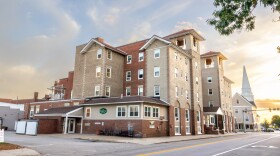NHPR producers and reporters have been talking with voters, across the state and in the Lakes Region, to learn what issues are the most important to them ahead of Tuesday’s presidential primary election.
One of the top issues we’ve heard from voters again and again is access to housing. Rob Dapice is the executive director of New Hampshire Housing. He joined NHPR’s All Things Considered host Julia Furukawa at the Tilt’n Diner to talk about access to affordable housing in the Lakes Region and across the state.
Transcript
Rob, what are some of the housing needs that we see specific to the Lakes Region?
Well, in a lot of ways, the Lakes Region is not too different from the rest of New Hampshire in that we don't have enough supply. We need more housing, and we need a lot of different kinds of housing to meet the changing needs of the community. The Lakes Region does have a couple of, if not unique, special characteristics that are sort of specific to more tourist, touristy regions that make the problem a little bit more complicated, and certainly the solution is a little bit more complicated, too.
Can you talk a little bit more about that tourism dependent economy in this area? How does it affect housing costs?
Well, certainly it increases demand, and demand increases costs. And in a lot of the state, and what I think virtually every municipality in the state needs to do in order to meet the needs of its community, is allow more construction of housing, whether that's multifamily or single family. I think what's true in the Lakes Region and in other areas that are really popular with tourists and second home buyers, that's not enough. Allowing construction all by itself won't solve the problem. You've got to really be thinking about who's going to live in that property. Is it going to be occupied by year round residents, by people who are going to go to school there, work locally and things like that. So it makes it a little more complicated.
Rob, we recently spoke with Freeman Toth from the Community Action Program in Merrimack and Belknap Counties. He helps people apply for rental assistance programs, and here's what he had to say about how this is affecting people in the region.
Freeman Toth: I am literally seeing people from all walks of life now experiencing homelessness and poverty. It's the person who has two full time jobs. You know, we're talking about hospital workers and hospitality staff and frankly, teachers and our elderly. That has changed over the last five years. And now it's very obvious that it's everybody that is being hurt by this lack of affordable housing.
So some powerful words from Freeman there. But what gives you hope here in New Hampshire when it comes to addressing this crisis? What is the light at the end of the tunnel for us?
Yeah. I mean, it's perhaps a distant light, but I think that difficult reality, the silver lining to the reach of the housing crisis is that a lot more people are feeling it or somebody they know or love has struggled with housing insecurity, whether that means being literally homeless or just really having a hard time finding someplace where they can afford to live and be stable for a period of time, and that meets their needs. And I think the result of that is that we're seeing housing conversations happen in places like Plymouth, Wolfeboro, and Meredith and Moultonborough that probably wouldn't have been happening five or 10 years ago.
You just gave us some examples of some towns [where] things are working well. They're moving toward this goal. Could you talk a little more about that? Are there tourist towns, whether here in New Hampshire or maybe elsewhere, other models that you've seen that are doing a good job of providing workforce housing for the people who make those economies run?
There are, and I think Conway, New Hampshire is a great example of that. You know, that's a very tourist driven, service industry rich place where any new home that's introduced to the market most likely is going to be bought by a second homeowner. And as a result, that town has made a lot of changes to allow for new construction of rental housing, workforce housing, senior housing, things that people in the community really need. You know, New London is another interesting example. [It’s] in a different lake, I guess, but they've recognized the need for it in a place that hasn't historically been welcoming to it. [It's] permitted a new apartment building right across from New London Hospital, just recognizing the needs of the workforce in that town.
Recently, some towns have been cracking down and imposing more regulations on short term rentals. We hear a lot about short term rentals. How could that potentially help with the region's housing crisis?
It's hard to say. So we've done some study on this and we just recently published a study, which is available on our website. We're trying to sort of understand better the effect of short term rentals on our rental market. At the county level at least, we didn't see a real strong correlation between short term rentals and increased rents. And that may be because a lot of those short term rentals were second homes already and just weren't visible as vacation homes. But I think it's a reasonable thing for communities to think about. And if not banning them outright, thinking about regulating behavior so that the community doesn't sort of fundamentally change, because there's a party happening in the house every other weekend.
So about one-third of all housing units in the lakes region are considered vacant, and that includes secondary or vacation homes. So what role do vacant housing units have on housing in the area?
Again, that just increases demand because you've got a lot of people who are buying homes in the area who aren't working in the area or living in the area year round. That said, it's always been an element of the sort of housing mix in areas like this. And so, you know, I think most people recognize that that brings some value as well, but there needs to be a balance.
And I'll close with this, Rob. This crisis, housing, it affects just about everyone. And it's probably why it's top of mind for so many folks that we've heard from. What kind of policy proposals would you like to see nationally or locally that could help bring down the cost of housing?
Well, I'm glad you asked a local question, because actually a lot of people think about what can Washington do to solve this problem. But most of the solutions are at the local level in terms of allowing reasonable opportunities for creation of new housing by great grassroots organizations in the community. There's a lot of good work happening at the state level, too, including expanded rights for accessory dwelling units, so-called granny flats, and a few other initiatives that I think could make a difference. So I think, it's appropriate, even though the New Hampshire Primary is exciting to think about, state and local solutions as being probably the most powerful things that can happen to solve this crisis.









